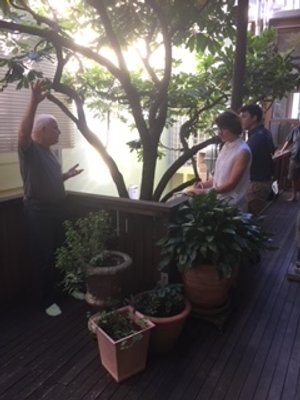Deb Gray shares her story to harvest solar energy and rainwater at The Bogey Hole cafe and unit above at Bronte Beach, Sydney, Australia.
We live in a terrace building above a row of cafes, one of which we own, The Bogey Hole Cafe, in Bronte Beach, Sydney, Australia. We ran the cafe for almost 20 years beginning in 1993 but we were very glad when our daughter Hannah More took the reins in 2012 and she has gone from strength to strength adding a thriving catering business as well.
This is my story of how we’ve chosen to use the sun and rain which falls here.
I am happy to know and be a neighbour of Barbara Landsberg from Landsberg Garden Design. I thought the job would be too small for her to take on but I’m very grateful she did.
Our whole block is less than 200 square metres. The land slopes up from the street so the area we were renovating is actually on the first floor level. Access was very difficult for all building materials and especially the water tanks. It’s lucky that my parents live next door and we were able to access our backyard by using their unused shopfront, into their ground level backyard and then via a hoist onto their first storey landing and then into our backyard.
Phew!
I met Michael Mobbs when we did the tour of his sustainable house in Chippendale. He certainly made an impression by being totally off grid despite his block being less than 200 square metres also.
We took our first steps in sustainability by installing solar panels a few years ago.
The next thing was water tanks and the garden renovation prompted by dilapidated decks and footings and fences was the perfect time to incorporate these. I can’t tell you how good the sound is of those first drops of rainwater tinkling into those empty tanks.
We installed 3 tanks, 2 x 3000 litres, 1 x 2000 litres from a company called Thintanks based in SA. We chose the dark grey colour Monument and painted the wall behind to match.
I thought they would need to be screened with plants but now I think they look sexy!
La Niña this summer has kept our tanks full to the brim of course. Not that I’ve needed to do much watering of the garden so far, but when you do, it just feels so right to be using water that you’ve saved.
It all happened during Covid lockdowns, builders being locked down and of course the odd Covid infection!
A big thank you to Luke Beardmore from Raw Built Projects who handled every new obstacle with aplomb and eventually turned up with the goods. We are so happy with the workmanship.
• First floor deck area with dilapidated railings, decking and fences.
• Wooden stairs from cafe courtyard
• Old deck and garden planting
• Brazilian plume plant
• From big to little plant . . .
My favourite Brazilian plume plant which we managed to keep alive (albeit as a tiny shrub) through the 6 month renovation process. This is the before….. and this is the after, that’s right in that order! We hope that we can get it back to its former glory. It was given to me by my brilliant gardening friend Jacky Rolle.
• Worm tower
Behind the plant is one of those worm towers where you drill large holes in the PVC pipe, fill with compost and the theory is the worms crawl in and out through the holes fertilising the garden without you having to dig in the compost. In such a small garden, I’ve found it difficult to find any space to employ a spade so I decided to give these a go in the new garden. I use all our kitchen scraps plus the juice pulp from the cafe downstairs. The worms love it. I have also started the Bokashi system which seems to be working pretty well but I’ve got to say I don’t enjoy the smell when you are draining the Bokashi juice.
• Michael Mobbs discussing with landscape designers Barbara Landsberg and Ben Miura, how best to use roof for harvesting rainwater
• Old deck and bearers removed.
• Second hand bricks that blend in better with existing lower brick stairs, replacing timber stairs
• Trying to get the 3 water tanks from ground level up to first floor level via a hoist in neighbour’s yard. In fact, all building materials went in and out via this method
• Curved outdoor shower recess going in
• Recycled railway sleepers for decking
• Hand railing replaced
• Sandstone capping on retaining wall
• Timber pergola to carry water to shower, a combination of rainwater and mains hot water. It was a disappointment not to use rainwater solely but to be able to have a hot shower seemed a little too complicated and costly.
• Brick stairs complete
• Daybed and planting completed
• Rain shower head with loose stones to stand on. I love the feel of that uneven ground beneath the feet
• And very happy with the lighting, courtesy of Landsberg Garden Design and Simon at Light Up Kingsford
So glad we were able to keep a few big trees, an aralia, a buckinghamia and 3 tall palms including a kentia.
Deb Gray





















